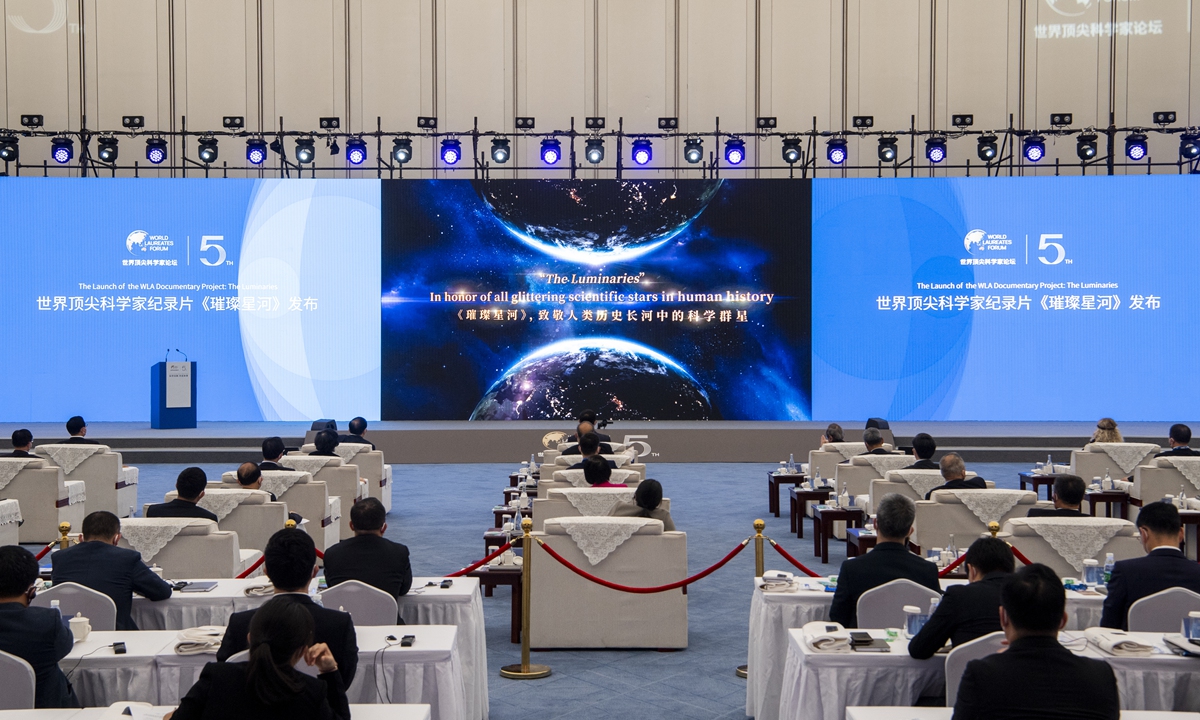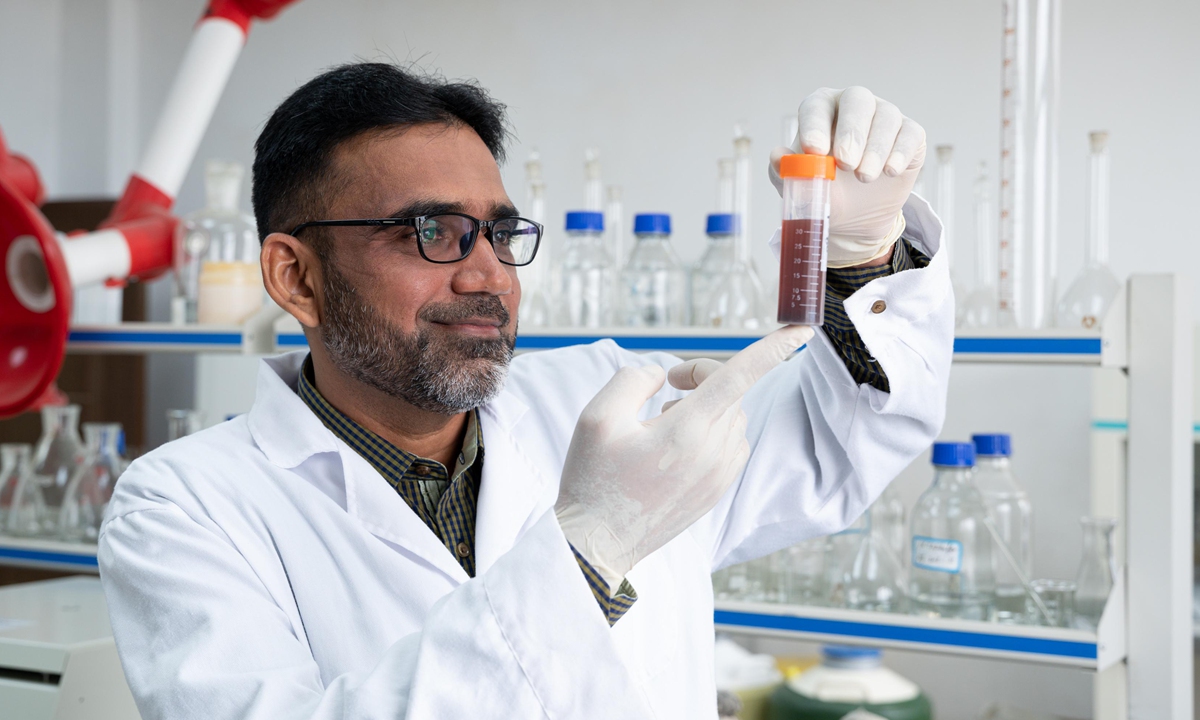IN-DEPTH / IN-DEPTH
Chinese forum of global scientists increasingly gathers top researchers sharing vision of globe’s future
Building up pinnacle of science

Photo: IC
What is the view from the "pinnacle of science" created by China? Amid once-in-a-century global changes, what could the effect of opening up an exclusive event in science be?
The 2022 World Laureates Forum (WLA Forum), which brought together 60 decorated scientists from over 20 countries and regions, including 27 Nobel Laureates, presents a wonderful answer to Chinese and global audiences.
Should there be more support to ensure carbon emission reduction in developing countries? Should there be tolerance for varied energy transition paths taken by different countries? In the past, differences of opinion on these issues were often a "stumbling block" to international cooperation. But now in Shanghai, global scientists are willing to face difficulties and work together to find scientific solutions to the common challenges facing humanity. The old and new friends alike of the international scientific community particularly value this great scientific event, where they share the latest academic findings, seek to adapt to the new realities of scientific collaboration mechanisms, and discuss solutions to common human problems.
This year marks the fifth year of the WLA Forum. Over the last five years, the success of the forum has reflected China's trust in the power of technology to drive innovation and development, which also witnessed the country's receptiveness to advocate for international cooperation, and made more young people feel the joy of being part of scientific discovery.

The 2022 World Laureates Forum (WLA Forum) on November 6, 2022, in Shanghai Photo: VCG
Faith in science
"When we talked to foreign experts at the forum, many of them felt amazed and excited that so many top scientists with such great minds from across the world and various scientific research backgrounds could travel all the way to Shanghai, congregating to discuss the development of science," said Jiang Xuefeng, professor of chemical and molecular engineering from the East China Normal University.
Against the backdrop of the COVID-19 global pandemic hampering international travel and the pursuant chaos, what made a forum hosted by a nongovernmental organization attract the attention of the world's top scientists?
It's a veritable scientific grand meeting, as the Forum provides a unique opportunity to learn about the latest advancements in different fields, Roger Kornberg, 2006 Nobel Laureate in Chemistry and chairman of the World Laureates Association (WLA), said at the opening ceremony of the forum.
Seeking to fulfill the three missions of promoting basic science, advocating for international cooperation, and supporting the development of young people with the vision of "Science and Technology for the Common Destiny of Mankind," it is the WLA's focus on science that resonates, making scientists around the world passionate and supportive of this forum, contributing a wealth of insights to some of humanity's most pressing problems, Yu Licheng, secretary-general of the WLA Shanghai Center, told the Global Times.
"The success of the forum reflects the importance China attaches to science and its attitude of openness toward the world," Jiang said.
Taking the inaugural WLA Prize as an example, the Prize in the Computer Science or Mathematics went to American computer scientist Michael I. Jordan, and German biochemist Dirk Görlich won the prize in the Life Science or Medicine. Both scientists received a monetary reward of 10 million yuan ($1.4 million), making the prize one of the world's highest scientific awards.
The WLA Prize is the first global scientific award initiated and established in the Chinese mainland, benchmarked by the world's highest academic standards, and conveying to the world the attention and esteem that China places on basic cutting-edge science, said Zhou Chengxiong, deputy director of Consultation and Research Center for Strategic Issues at the Chinese Academy of Sciences.
The prize is an international award led by a Chinese non-government institution and recommended by global leading scientists, Yu said, "The international and civil science cause needs more attention and support from all facets of society in the process of development. Fortunately, the whole of Chinese society is now paying more attention to science's popularization and innovation," he stressed.
Zhou pointed out that at present, Chinese institutions spending such a huge amount of money to establish such awards reflects China's confidence and determination to be deeply involved in the world's top scientific academic circles, which also helps to raise public awareness on science and technology, and deepen the understanding of international scientific and technological development progress.
In recent years, China has made unprecedented investments in science and technology, with social spending on research and development (R&D) growing from 1 trillion yuan in 2012 to 2.8 trillion yuan in 2021.
"We have grown stronger in basic research and original innovation, made breakthroughs in some core technologies in key fields, and boosted emerging strategic industries," said the report to the 20th National Congress which shared highlights of China's scientific achievements over the last decade that have inspired the country's people and also amazed the world.
China's ranking in the Global Innovation Index, released by the World Intellectual Property Organization, rose from 34th place in 2012 to 11th place in 2022.
It is believed that in the future, the number of China's science and technology awards will further increase. More and more top global scientists will be proud to receive China's science and technology awards, Zhou said.

A Pakistani scientist studies water buffalo in China. Photo: VCG
Calling card for Shanghai
In Shanghai, Kornberg shared with the Global Times an interesting event he participated - he spoke with journalists at the fifth China International Import Expo (CIIE) at the WLA Forum.
Both the WLA Forum and the CIIE held concurrently in Shanghai under the theme of openness and cooperation were a great opportunity for Chinese and global audiences to experience both events simultaneously. We are very pleased that the WLA Forum will follow the CIIE and become a calling card for Shanghai, allowing visitors from China and the world to experience the development opportunities brought about by the two great events, he said.
"Never before have the Chinese paid more attention to basic scientific research, and never before have the Chinese advocated for international cooperation more vigorously," Yu said, noting that in the face of a complex international environment and a profound change in the paradigm of scientific research, the WLA Forum has become a common expectation of the global scientific community for openness, exchanges, cooperation, and integration.
At this year's forum, scientists from all over the world exchanged information and ideas on the latest advances in various disciplines regarding the common challenges facing mankind including bioscience, artificial intelligence, agricultural breeding, and zero carbon development.
During the forum, Yang Wei, an academician at the Chinese Academy of Sciences, on behalf of the Chinese scientific and technological community, released the "Initiative on International Cooperation in Scientific Research", conveying the voice of all Chinese scientific researchers to the world: "Deepen and expand the global scientific and technological community of equality, openness, and cooperation with the global scientific and technological community. Partner and jointly build a community with a shared future for mankind."
On the shore of Dishui Lake in Lingang Special Area of the China (Shanghai) Pilot Free Trade Zone, like an egret spreading its wings, the permanent venue of the World Laureates Forum was put to use on November 4, and an international R&D community was unveiled on the same day.
As the first "scientific community" in China, a number of joint labs are expected to be launched in the international R&D community by 2025 to attract top-notch scientists and young researchers from around the world.
Shanghai presents itself as a fertile ground for international scientific cooperation, which, as of 2021, was home to 516 R&D centers by foreign companies and five representative offices for international science and technology organizations.
In recent years, China has participated in more than 200 international organizational and multilateral mechanisms involving science and technology, established scientific and technological cooperation with 161 countries and regions, signed 114 intergovernmental agreements on scientific and technological cooperation, launched the construction of 53 joint laboratories under the China-proposed Belt and Road Initiative (BRI), and built five national-level regional technology transfer platforms with ASEAN, South Asia, Arab countries, Central Asia, and Central and Eastern Europe.
Passing the baton
This is the third time that Ni Jiazhou, a sophomore at Hunan University, has attended the WLA Sci-T Conference held for the youth aspiring to devote themselves to scientific research.
This time Ni had an opportunity to interact with well-known Chinese geologist Wang Pinxian, 86, who is an academician at the Chinese Academy of Sciences and still works on popularizing professional scientific knowledge to the public. Ni told the Global Times that he worships Wang and is a "fan" of the senior academician.
He sought advice from Wang about the boundary between scientific research and the popularization of science, which are also to be his two fields of focus in the future.
"Through the conference, my academic vision and thinking methods have been greatly improved and the chance to communicate with top scientists is so rare and helpful to me," Ni said. He hopes that such an event can be held more frequently, providing scientists and science enthusiasts alike more platforms for self-expression that can bolster their confidence.
"For a country, a society, and even the world, scientific development is a kind of baton-passing process. Scientists from different research backgrounds have reached the consensus that their achievements have been made on top of their predecessors' achievements, thus the inheritance and systematic development of science have to be considered for the sake of the advancement of humankind," Jiang said.
The Sci-T Conference saw and highlighted this consensus, to attract more youngsters to become interested in, love, and take up science and scientific research as their future career, and constantly innovate in the field, he noted.
Ni said he has been feeling support from the authorities in guiding him to take the route of science.
Currently, like Ni, lots of Chinese young people who have an enthusiasm for scientific research have benefited from diverse measures promoted by the Chinese government to cultivate young scientific talents.
The Ministry of Science and Technology released a notice in August 2022 which encourages qualified scientific research institutions to set up special programs to train young professionals at the initial career stage.
Speaking of cultivating young scientists, the Chinese government also insists on focusing on the world and the future, supporting more young scientists to actively integrate into global innovation networks, and deeply participate in global science and technology development.
Thanks to the economic take-off and the tremendous efforts made by the state to develop education, this generation of young people has very active minds and a good scientific and cultural foundation along with the ability to analyze problems logically and independently, Jiang said. "They could be a great driving force for innovation in China in the future," he noted.


